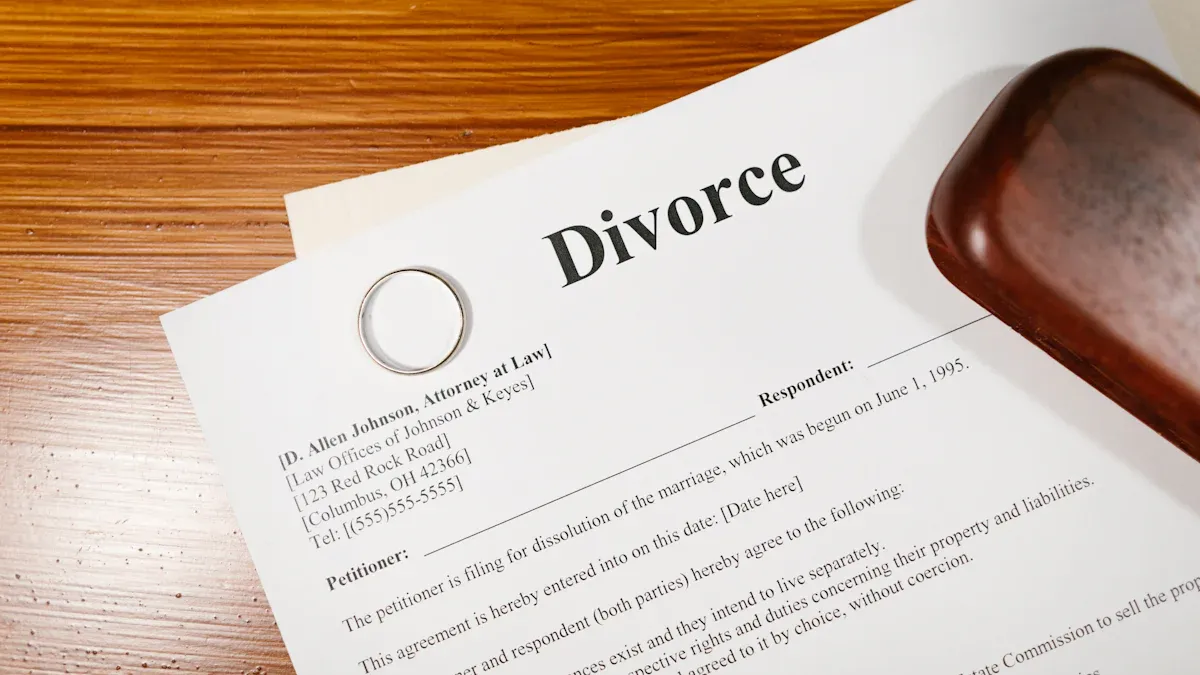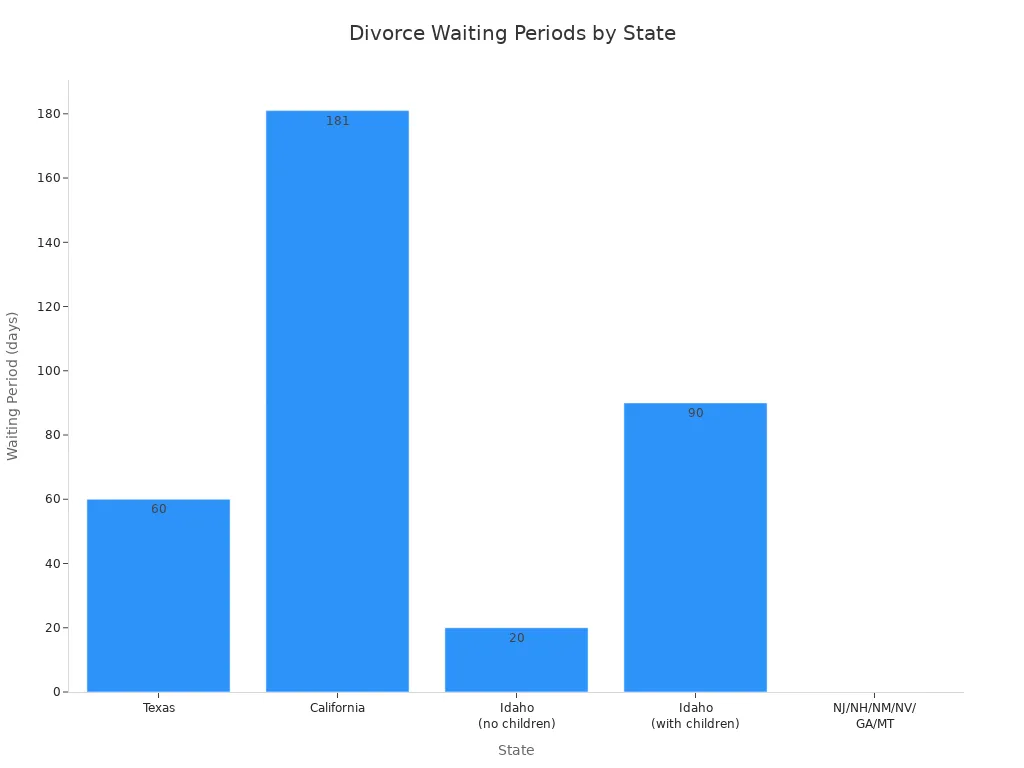What the 60-Day Waiting Period Means for Texas Divorce

Texas law says you must wait before your divorce. The 60-day waiting period begins when you file your case. Every Texas divorce must follow this rule, even if you both agree. Lawmakers made this rule to help you think about your choice. It also gives you time to solve important problems.
The waiting period lets you think about your decision.
You can use this time to agree on property, children, or support.
Only cases with domestic violence do not have to wait.
60-Day Waiting Period in Texas Divorce

What Is the Mandatory Waiting Period
Texas law has a rule for divorce. You must wait 60 days after you file. The judge cannot grant your divorce before this time. This rule is from Texas Family Code § 6.702. The 60 days start when you file your divorce petition. Courts only make exceptions for family violence or protective orders. Annulments and void marriages do not need this waiting period.
The Texas Family Code § 6.702 says:
"A court may not grant a divorce before the 60th day after the date the suit was filed. Exceptions apply only in cases involving family violence or protective orders."
You must follow this rule even if you both agree. The court will not finish your divorce before 60 days. This rule is for all texas divorce cases, whether you agree or not.
How does Texas compare to other states? Some states have no waiting period. Others make you wait longer. Here is a table to show the differences:
State | Waiting Period | Notes |
|---|---|---|
Texas | 60 days | Mandatory waiting period; no legal separation status; waiting period substitutes legal separation |
Utah | 30 days (can be waived) | One of the shortest; waiver possible depending on circumstances |
California | 6 months | Longest mandatory waiting period; complex divorce laws; summary dissolution available under strict conditions |
Wisconsin | 120 days | Long waiting period; no reason needed for divorce; 6-month remarriage prohibition post-divorce |
NJ, NH, NM, NV, GA, MT | None | No cooling-off period required |

Why Texas Requires a Waiting Period
You might wonder why Texas makes you wait. The 60-day waiting period has important reasons. Texas courts want you and your spouse to think about your choice. This time is a "cooling-off" period. It helps you avoid a decision you may regret.
The waiting period lets you think about your marriage and maybe get back together.
You can talk with your spouse about property, child custody, and support.
Lawyers say you should use this time to gather papers, plan, and get help if you need it.
Many people think the waiting period makes divorce take longer. But the 60 days is just the minimum. Your texas divorce may take longer if you and your spouse do not agree.
Texas courts almost never make exceptions to the waiting period. Judges only skip the rule for urgent cases, like family violence. This helps keep victims safe and lets them move on.
Some reasons for the waiting period are:
Giving both people time to think and maybe fix things.
Allowing time to get legal papers and agreements ready.
Protecting families from quick decisions.
You can use the waiting period to talk, plan, and get ready for life after divorce. Many people say this time helps them make better choices and feel less stress.
When the Waiting Period for Divorce Starts
Filing Date and Timeline
When you begin the texas divorce process, the timeline starts with filing for divorce. You must file a divorce petition with the court. This step marks the official start of your case. After you file, your spouse must receive legal notice. The court calls this being "served" or signing a waiver of citation.
Here is how the process works:
You file the divorce petition with the court.
Your spouse gets served with the petition or signs a waiver.
The 60-day waiting period begins on the day you file, but the process cannot move forward until your spouse is served or waives citation.
The court will not finalize your divorce until the waiting period ends.
Tip: Keep track of your filing date. This date is important for all deadlines in your case.
Calculating the 60 Days
You need to count 60 days from the day you file your divorce petition. Day one is the day you file. The waiting period includes weekends and holidays. If the 60th day falls on a weekend or holiday, the next business day counts as the end of the waiting period.
Texas courts check that you have met the 60-day waiting period before they allow you to finish your divorce. The court schedules your prove-up hearing only after the waiting period ends. At this hearing, you answer questions under oath about your case. The judge reviews your paperwork and makes sure you followed all rules, including the waiting period. If you try to finish your divorce too soon, the court may delay your hearing or even dismiss your case.
The prove-up hearing cannot happen until at least 60 days have passed since you filed.
Only cases with family violence may skip the waiting period.
The judge will ask questions to confirm you understand the terms and agree to them.
If you do not wait the full 60 days, your case may face delays.
Note: Some counties let you finish the process online or by affidavit, but the 60-day waiting period still applies.
Exceptions to the Mandatory Waiting Period
Family Violence Exception
Texas law is strict about family violence. If you are abused, you might not have to wait 60 days for divorce. The court can skip the waiting period if you show proof of family violence. You must give the judge certain documents. These can be:
Proof your spouse was convicted or got deferred adjudication for family violence.
Police or court records showing domestic violence happened.
You need to file a motion with your divorce petition to ask for this waiver. The court will look at your papers and decide if you qualify. If you have a protective order or your spouse has a conviction, the judge can let your divorce go forward right away. This helps keep you and your children safe from harm.
Tip: If you feel unsafe, talk to a lawyer or support group. They can help you get the right papers and guide you through the steps.
Other Rare Exceptions
Texas courts almost never skip the 60-day waiting period for reasons besides family violence. The law only allows exceptions if:
You have a protective order against your spouse because of violence during your marriage.
Your spouse was convicted or got deferred adjudication for family violence against you or someone in your home.
No other rare reasons let you skip the waiting period. If your case does not involve family violence, you must wait the full 60 days before the court can grant your divorce. This rule applies even if both you and your spouse agree to end the marriage.
The waiting period helps protect families and gives everyone time to get ready for life after divorce.
What Happens During the Texas Divorce Process

Negotiations and Temporary Orders
When you start the texas divorce process, you and your spouse must make choices. You need to decide on some things before the court finishes your case. Most people use this time to talk and set up temporary rules. These rules help you both handle daily life until the divorce is done.
You may need to figure out a few things, like:
How to split property and debts, including what you own together and what is yours alone.
Who will have child custody and how to make a parenting plan that is best for your child.
If you need temporary child support or spousal support.
Sharing information about money, debts, and retirement accounts.
Deciding who stays in the family home or who pays certain bills.
Temporary orders help keep things calm and fair. The court can make these orders if you and your spouse cannot agree. Lawyers say it is smart to get help from an attorney at this time. Mediation can also help if you cannot agree. These steps are important in the texas divorce process.
Tip: Temporary orders do not last forever. They only work until the court finishes your divorce.
Preparing for Finalization
When the waiting period is almost over, you need to get ready for the last steps. The texas divorce process has some important things you must do before the judge can sign the final papers.
Answer the petition on time.
Share important papers, like money records, with your spouse.
Try to solve all problems by talking or using mediation.
If you cannot agree, the court will decide at a trial.
After you agree or the judge decides, you go to a prove-up hearing. At this hearing, you promise you understand and accept the terms. The judge checks everything and signs the final papers. This makes your divorce official and legal.
Note: Look over your final papers carefully. This helps you avoid mistakes and problems later.
After the Waiting Period Ends
Finalizing the Divorce
After the 60-day waiting period, you can finish your divorce. You need to fill out all forms and go to court if needed. The judge will look at your plans for property, kids, and support. If everything is correct, the judge will sign the final divorce papers.
Sometimes, there are delays even after waiting. Some reasons for delays are:
Not paying attention to important legal papers, which means more steps.
Filing too many papers that are not needed.
Changing lawyers a lot, which makes things slower.
Asking for too much or too little information during discovery.
Requesting more time to move court dates.
Other things can also slow down your texas divorce:
Needing a detailed plan for parenting if you have children.
Dividing things like businesses or many houses.
Waiting for court dates or special checks.
You can stop many delays by being organized and following the steps in the texas divorce process. Mediation can help you agree faster.
Tip: Keep copies of all your papers and answer the court quickly. This helps you finish your divorce without waiting longer.
Remarriage Waiting Period
After your divorce is final, Texas law says you must wait before marrying again. You have to wait 30 days after the judge signs your divorce papers before you can remarry. This rule gives you and your ex-spouse time to ask the court to change the divorce terms.
Here are some facts about the waiting period for marriage after divorce in Texas:
The 30-day wait starts when the divorce papers are signed.
The shortest time from filing for divorce to remarrying is about 90 days.
You do not have to wait if you want to marry your ex-spouse again.
A judge can let you skip the 30-day wait for good reasons, like military duty, health problems, or being apart for a long time before divorce.
Note: The waiting period helps both people and makes sure the divorce is fair and final.
If you want to get married soon, ask the court if you can skip the wait. Always make sure your divorce is really finished before making new plans.
The 60-day waiting period in Texas lets you think about your divorce. You can use this time to get facts and ask for help. It is a good time to make choices about what comes next. Many people feel less worried when they know what will happen. Support groups, therapy, and legal help can guide you. This time helps keep you safe and lets you make smart choices.
FAQ
How do you know when your 60-day waiting period ends?
You count 60 days from the day you file your divorce petition. If the 60th day falls on a weekend or holiday, you use the next business day.
Can you live together during the waiting period?
Yes, you can live in the same home during the waiting period. Texas law does not require you to move out while your divorce is pending.
What if your spouse does not respond after being served?
If your spouse does not respond, you can still finish your divorce after the waiting period. The court may grant a default judgment if you follow all steps and file the right papers.
Can you speed up the divorce process in Texas?
You cannot shorten the 60-day waiting period unless you qualify for a family violence exception. You can prepare your documents and agreements during this time to avoid extra delays.
See Also
Understanding Texas Sixty Day Divorce Waiting Requirement
Duration Of Spousal Abandonment Needed For Texas Divorce
Step By Step Guide To Beginning Divorce In Texas
Subscribe to get the updates!
Sign up now to receive timely blog updates.
I accept the email subscription terms.

